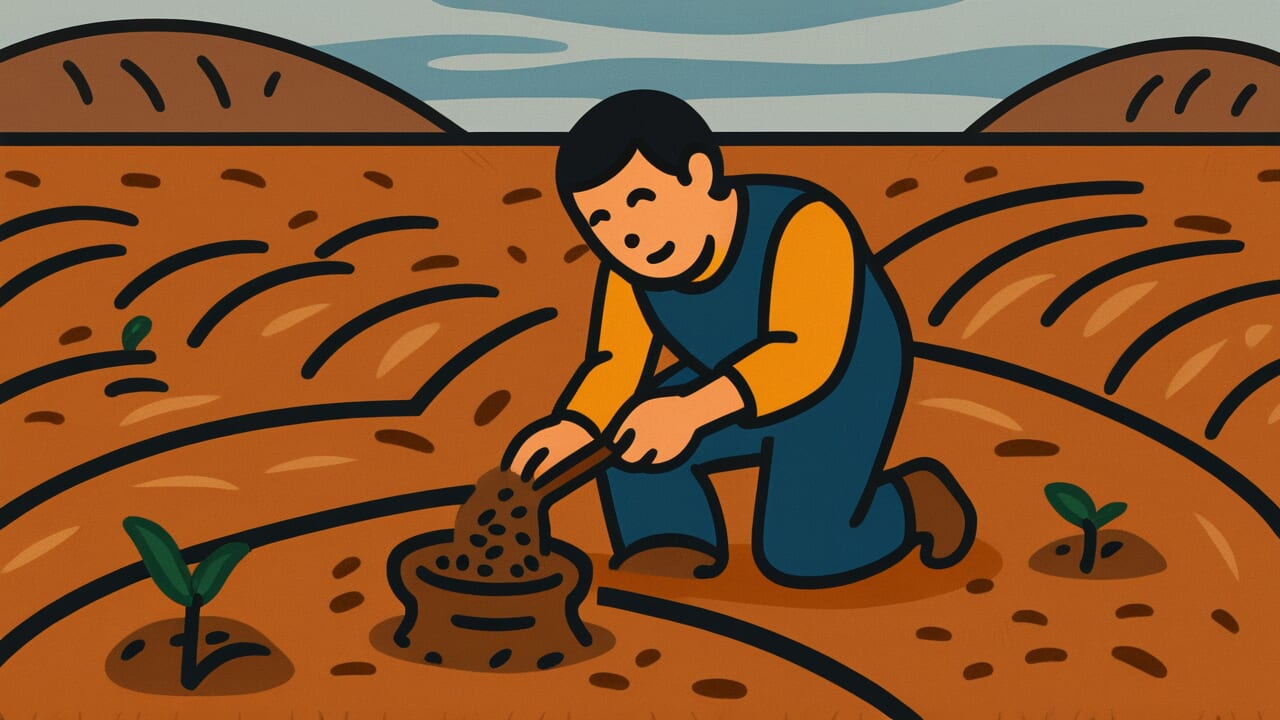How to Read “Sow beans in the mud, they’ll grow like wood”
Sow beans in the mud, they’ll grow like wood
[SOH beenz in thuh MUHD, thay-uhl GROH lahyk wood]
Meaning of “Sow beans in the mud, they’ll grow like wood”
Simply put, this proverb means that when you work under the right conditions, you get strong and lasting results.
The saying uses farming language to teach us about success. When you plant beans in rich, muddy soil, they grow strong like wood. The mud gives the beans everything they need to become sturdy plants. This teaches us that having the right environment makes all the difference.
We use this wisdom when talking about work, learning, and personal growth. If you study in a quiet place with good books, you learn better. If a business starts with enough money and good planning, it grows stronger. The right conditions help everything flourish and become solid.
What’s interesting about this wisdom is how it shows that struggle isn’t always the answer. Sometimes people think hard work means fighting against bad conditions. But this proverb suggests that smart work means finding or creating the right conditions first. Then your efforts produce something as strong and lasting as wood.
Origin and Etymology
The exact origin of this specific proverb is unknown, though it reflects ancient agricultural wisdom found in many farming communities.
Sayings about planting and growing have existed for thousands of years because farming was central to human survival. People who grew food had to understand which conditions produced the best crops. They learned that rich, wet soil often grew stronger plants than dry, poor ground. These observations became wisdom passed down through generations.
Agricultural proverbs spread as people moved and traded with each other. Farmers shared knowledge about planting, weather, and soil conditions. Over time, these practical tips became metaphors for success in other areas of life. The connection between good growing conditions and strong results made sense to people in any time period.
Interesting Facts
The word “sow” comes from Old English meaning “to scatter seed,” and it’s one of humanity’s oldest farming terms. Beans have been cultivated for over 7,000 years and were among the first crops humans learned to grow systematically. The comparison to wood in proverbs often represents strength and permanence, since wood was the primary building material for most of human history.
Usage Examples
- Farmer to neighbor: “Don’t plant your tomatoes in that waterlogged soil – sow beans in the mud, they’ll grow like wood.”
- Teacher to student: “You can’t rush your essay the night before and expect good results – sow beans in the mud, they’ll grow like wood.”
Universal Wisdom
This proverb reveals a fundamental truth about how success actually works in the natural world and human endeavors. We often believe that struggle and hardship automatically create strength, but nature shows us something different. Plants that grow in ideal conditions develop stronger root systems and more resilient structures than those fighting poor soil.
The deeper wisdom addresses our tendency to glorify difficulty for its own sake. Humans have always faced the choice between working harder or working smarter. This saying suggests that creating favorable conditions isn’t cheating or taking shortcuts. Instead, it’s recognizing that sustainable success comes from alignment with natural principles rather than fighting against them.
What makes this truth universal is how it applies to every aspect of human development. Children learn better in supportive environments. Relationships thrive when both people feel secure. Communities grow stronger when basic needs are met. The proverb captures something our ancestors observed repeatedly: that the right foundation produces results that last. It challenges the myth that suffering is necessary for growth, suggesting instead that proper conditions allow our natural potential to emerge as something solid and enduring.
When AI Hears This
People avoid messy situations because they look unprofessional or chaotic. Yet these muddy environments contain the most diverse challenges and feedback. Clean, controlled settings feel safer but lack the complex problems that build real skills. We choose polished opportunities over rich, complicated ones that would strengthen us more.
This happens because humans mistake surface appearance for actual quality. We think organized environments will produce better results than disorganized ones. Our brains evolved to avoid chaos and seek order for survival. But growth requires wrestling with multiple contradictory forces at once, not simple, neat conditions.
What fascinates me is how this bias actually protects human potential. By avoiding truly easy paths, people end up in moderately challenging situations. The fear of mess pushes humans toward difficulty that builds character. This seemingly flawed thinking creates accidental wisdom, forcing growth through the back door.
Lessons for Today
Living with this wisdom means learning to recognize and create favorable conditions rather than just pushing harder when things aren’t working. This doesn’t mean avoiding all challenges, but understanding that some struggles come from poor conditions rather than insufficient effort. When something isn’t growing as expected, the first question becomes whether the environment supports what you’re trying to achieve.
In relationships and teamwork, this wisdom suggests focusing on creating mutual support and understanding before tackling difficult projects together. Just as beans need rich soil, collaborative efforts need trust and good communication to produce lasting results. This might mean spending time building relationships before jumping into challenging work, or ensuring everyone has what they need to contribute effectively.
The challenge lies in distinguishing between necessary effort and counterproductive struggle. Sometimes we stay in poor conditions because we think persistence alone will overcome any obstacle. But this proverb suggests that recognizing when to change the environment is as important as working hard within it. The goal isn’t to avoid all difficulty, but to ensure that your efforts have the foundation they need to create something strong and lasting.



Comments